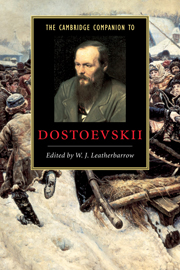Book contents
- Frontmatter
- 1 Introduction
- 2 Dostoevskii and the Russian folk heritage
- 3 Dostoevskii and literature
- 4 Dostoevskii as a professional writer
- 5 Dostoevskii and money
- 6 Dostoevskii and the intelligentsia
- 7 Dostoevskii and psychology
- 8 Dostoevskii and religion
- 9 Dostoevskii and the family
- 10 Dostoevskii and science
- 11 Conclusion
- Further reading
- Index
9 - Dostoevskii and the family
Published online by Cambridge University Press: 28 May 2006
- Frontmatter
- 1 Introduction
- 2 Dostoevskii and the Russian folk heritage
- 3 Dostoevskii and literature
- 4 Dostoevskii as a professional writer
- 5 Dostoevskii and money
- 6 Dostoevskii and the intelligentsia
- 7 Dostoevskii and psychology
- 8 Dostoevskii and religion
- 9 Dostoevskii and the family
- 10 Dostoevskii and science
- 11 Conclusion
- Further reading
- Index
Summary
At the heart of Russian literary thought about the family in the 1860s and 1870s – in particular Dostoevskii's thought – stands Ivan Turgenev's 1862 novel Fathers and Sons. Although that work is ostensibly about chaos and destruction, as embodied in the 'nihilist' Bazarov, both the family structures depicted in it and the structure of the novel itself are remarkably harmonious and stable. Not only does Bazarov's callow friend Arkadii have a loving and devoted father and uncle, but Bazarov himself has salt-of-the-earth parents who worship the ground he walks on. The novel is built on the classic structure of comedy: by the end, the disruptive character who calls the social order into question (Bazarov) has been neutralised (by typhus), and an idyllic family group, which has incorporated the peasant mistress and her illegitimate son as lady of the manor and young master, gathers to celebrate a new patriarchal order presided over by the just-married son Arkadii.
- Type
- Chapter
- Information
- The Cambridge Companion to Dostoevskii , pp. 175 - 190Publisher: Cambridge University PressPrint publication year: 2002
- 16
- Cited by

